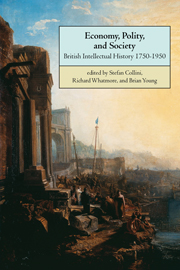Book contents
- Frontmatter
- Contents
- Preface
- General introduction
- Presentation of Economy, Polity, and Society
- Part I
- Part II
- 5 Economy and polity in Bentham's science of legislation
- 6 ‘A gigantic manliness’: Paine's republicanism in the 1790s
- 7 Irish culture and Scottish enlightenment: Maria Edgeworth's histories of the future
- 8 Improving Ireland: Richard Whately, theology, and political economy
- Part III
- List of contributors
- Acknowledgements
- Index
6 - ‘A gigantic manliness’: Paine's republicanism in the 1790s
Published online by Cambridge University Press: 18 December 2009
- Frontmatter
- Contents
- Preface
- General introduction
- Presentation of Economy, Polity, and Society
- Part I
- Part II
- 5 Economy and polity in Bentham's science of legislation
- 6 ‘A gigantic manliness’: Paine's republicanism in the 1790s
- 7 Irish culture and Scottish enlightenment: Maria Edgeworth's histories of the future
- 8 Improving Ireland: Richard Whately, theology, and political economy
- Part III
- List of contributors
- Acknowledgements
- Index
Summary
Thomas Paine's writings, like those of Adam Smith, have largely been associated with some of the major traditions of modern political thought: in Paine's case, liberalism, capitalism, and, most recently, social-democracy. The republican turn in intellectual history has done much to liberate Paine's ideas from association with causes he would not have recognised. A number of studies have added to our knowledge by placing Paine's work in the context of various neo-Harringtonian, Commonwealth, Old Whig and natural-law traditions which have been found in late eighteenth-century political discourse. One problem with this literature is that the term ‘republican’, so often one of abuse in the eighteenth century, is too pervasive. In particular, historians have not specified which states writers were talking about when using such terms, which makes a great deal of difference when describing a writer's political position. For example, it was possible to believe republics to be theoretically superior to monarchies while supporting the idea of Britain as a mixed monarchy which had little in common with historical republics. This was the view which Catherine Macaulay defended throughout her life, and which David Hume articulated in ‘The Idea of a Perfect Commonwealth’. Equally, Richard Price and Joseph Priestley believed in the ideal of a universal republic in which fraternity would reign, but neither described themselves as republicans when discussing Britain.
At first glance, Paine's republicanism does not accord with that of any contemporaries who were not his disciples. Paine was one of a very small number of Anglo-American writers who believed that Britain's mixed government did not suit her society.
- Type
- Chapter
- Information
- Economy, Polity, and SocietyBritish Intellectual History 1750–1950, pp. 135 - 157Publisher: Cambridge University PressPrint publication year: 2000
- 3
- Cited by



